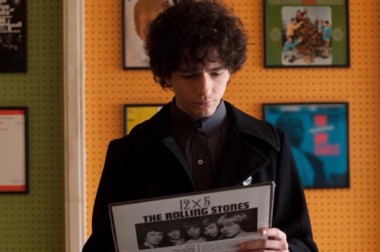If you only know of David Chase through his most famous work—he was the driving force behind the HBO juggernaut and cultural phenomenon that was The Sopranos—you might be surprised to learn that he is nearly 70 years old. Born in 1945, the man has worn just about every hat in the Hollywood wardrobe, beginning with a consulting gig on the ’70s-era supernatural mystery show Kolchak: The Night Stalker (a sort of X-Files for the disco era). His work on that short-lived series led to more lasting positions on shows like The Rockford Files and Northern Exposure, and he worked steadily until The Sopranos detonated in 1999. Though his breakout hit was praised for changing the face of television dramas, Chase himself—like Picasso before he turned toward Cubism—was schooled in tradition.
Now Chase turns back the clock to look at his own youth. With his new film Not Fade Away—his debut feature—Chase revisits the heady days of the British Invasion, when so many young Americans decided to follow in the footsteps of the Beatles and the Rolling Stones by starting bands of their own. It’s a story close to the director’s heart: as a young man, Chase played drums in a Jersey band whose ambitions outpaced their talents. But, like the young men who make up the core of his new story, they believed; for a time, that was enough.
Actually, the band in Not Fade Away is probably a good bit better than most. Fronted by gifted singer and young Dylan look-alike Douglas (John Magaro), they have a chance to go further than most if they can iron out a few wrinkles. One big one is taken care of when lead singer Gene has to bow out after swallowing a lit joint, giving drummer Douglas his chance to step into the spotlight. They get a lot of help from Chase’s old Sopranos pal Steven Van Zandt, who serves here as music producer and contributes an original song that he allows the band to claim as their own. When you’re making a movie about Jersey rock ’n’ roll, having Bruce Springsteen’s guitar player writing the tunes is not a bad idea.
Also on board from the HBO crew is James Gandolfini, here playing Douglas’ father Pat, a blue collar guy who at first looks askance at his son’s countercultural bent, only to come around a bit after being diagnosed with cancer. Gandolfini brings a subtle touch to these scenes, which help us remember that the ’60s were not only about the freewheeling youth who enjoyed a freedom unlike any other generation’s—they were also a time when the parents of those kids were sometimes forced to face up to their own regrets over the paths they could have followed, and didn’t.
Fans of The Sopranos might be shocked to discover a Chase-derived Jersey so devoid of violence, and in the end, Not Fade Away may well disappoint some fans of the show. But if it’s too genteel for them, their parents will understand.
Also this week: In an odd coincidence, Not Fade Away—which draws its title from a Rolling Stones cover of a Buddy Holly song—comes to the area the same week as Peter Whitehead’s 1965 documentary Charlie Is My Darling (Ireland, 1965). Screening at Northampton’s Academy of Music Jan. 5, that film (augmented by new footage and interview segments) covers a quick jaunt by the band to the Emerald Isle, where the Stones, then at the height of their magnetism, were mobbed by rabid fans. Of more interest to fans of the Stones/Beatles debate: footage of Mick and Keith in their Dublin hotel room, playing through a few tunes by Lennon and McCartney.
Jack Brown can be reached at cinemadope@gmail.com.



